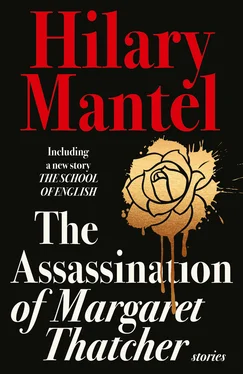‘Sure they’re lost,’ sister-in-law sang. She sniggered; she was enjoying herself. Nineteenth Lesson, translate these sentences: So long as he holds the map the wrong way up, he will never find the house. They started travelling this morning, but have still not arrived. It seemed a hopeless business, trying to get anywhere, and the text book confessed it. I was not really learning Arabic, of course, I was too impatient; I was leafing through the lessons, looking for phrases that might be useful if I could say them. We stayed long, long into the evening, waiting for the men who had never intended to come; in the end, wounded and surly, Ijaz escorted us to the door. I heard my husband take in a breath of wet air. ‘We’ll never have to do it again,’ I consoled him. In the car, ‘You have to feel for him,’ I said. No answer.
December 13th: My diary records that I am oppressed by ‘the darkness, the ironing and the smell of drains’. I could no longer play my Eroica tape as it had twisted itself up in the innards of the machine. In my idle moments I had summarised forty chapters of Oliver Twist for the use of my upstairs neighbour. Three days later I was ‘horribly unstable and restless’, and reading the Lyttelton–Hart-Davis Letters . Later that week I was cooking with my neighbour Yasmin. I recorded ‘an afternoon of greying pain’. All the same, Ijaz was out of the country and I realised I breathed easier when I was not anticipating the ring of the doorbell. December 16th, I was reading The Philosopher’s Pupil and visiting my own student upstairs. Munira took my forty chapter summaries, flicked through them, yawned, and switched on the TV. ‘What is a workhouse?’ I tried to explain about the English poor law, but her expression glazed; she had never heard of poverty. She yelled out for her servant, an ear-splitting yell, and the girl – a beaten-down Indonesian – brought in Munira’s daughter for my diversion. A heavy, solemn child, she was beginning to walk, or stamp, under her own power, her hands flailing for a hold on the furniture. She would fall on her bottom with a grunt, haul herself up again by clutching the sofa; the cushions slid away from her, she tumbled backwards, banged on the floor her large head with its corkscrew curls, and lay there wailing. Munira laughed at her: ‘White nigger, isn’t it?’ She didn’t get her flat nose from my side, she explained. Or those fat lips either. It’s my husband’s people, but of course, they’re blaming me.
January 2nd 1984: We went to a dark little restaurant off Khalid bin Wahlid Street, where we were seated behind a lattice screen in the ‘family area’. In the main part of the room men were dining with each other. The business of eating out was more a gesture than a pleasure; you would gallop through the meal, because without wine and its rituals there was nothing to slow it, and the waiters, who had no concept that a man and woman might eat together for more than sustenance, prided themselves on picking up your plate as soon as you had finished and slapping down another, and rushing you back on to the dusty street. That dusty orange glare, perpetual, like the lighting of a bad sci-fi film; the constant snarl and rumble of traffic; I had become afraid of traffic accidents, which were frequent, and every time we drove out at night I saw the gaping spaces beneath bridges and flyovers; they seemed to me like amphitheatres in which the traffic’s casualties enacted, flickering, their final moments. Sometimes, when I set foot outside the apartment, I started to shake. I blamed it on the drugs I was taking; the dose had been increased again. When I saw the other wives they didn’t seem to be having these difficulties. They talked about paddling pools and former lives they had led in Hong Kong. They got up little souk trips to buy jewellery, so that sliding on their scrawny tanned arms their bracelets clinked and chimed, like ice cubes knocking together. On Valentine’s Day we went to a cheese party; you had to imagine the wine. I was bubbling with happiness; a letter had come from William IV Street, to tell me my novel had been sold. Spearing his Edam with a cocktail stick, my husband’s boss loomed over me: ‘Hubby tells me you’re having a book published. That must be costing him a pretty penny.’
Ijaz, I assumed, was still in America. After all, he had his marital affairs to sort out, as well as business. He doesn’t reappear in the diary till March 17th, St Patrick’s Day, when I recorded, ‘Phone call, highly unwelcome.’ For politeness, I asked how business was; as ever, he was evasive. He had something else to tell me: ‘I’ve got rid of Mary-Beth. She’s gone.’
‘What about the children?’
‘Saleem is staying with me. The girl, it doesn’t matter. She can have her if she wants.’
‘Ijaz, look, I must say goodbye. I hear the doorbell.’ What a lie.
‘Who is it?’
What, did he think I could see through the wall? For a second I was so angry I forgot there was only a phantom at the door. ‘Perhaps my neighbour,’ I said meekly.
‘See you soon,’ Ijaz said.
I decided that night I could no longer bear it. I did not feel I could bear even one more cup of coffee together. But I had no means of putting an end to it, and for this I excused myself, saying I had been made helpless by the society around me. I was not able to bring myself to speak to Ijaz directly. I still had no power in me to snub him. But the mere thought of him made me squirm inside with shame, at my own general cluelessness, and at the sad little lies he had told to misrepresent his life, and the situation into which we had blundered; I thought of the sister-in-law, her peach chiffon and her curled lip.
Next day when my husband came home I sat him down and instigated a conversation. I asked him to write to Ijaz and ask him not to call on me any more, as I was afraid that the neighbours had noticed his visits and might draw the wrong conclusion: which, as he knew, could be dangerous to us all. My husband heard me out. You need not write much, I pleaded, he will get the point. I should be able to sort this out for myself, but I am not allowed to, it is beyond my power, or it seems to be. I heard my own voice, jangled, grating; I was doing what I had wriggled so hard to avoid, I was sheltering behind the mores of this society, off-loading the problem I had created for myself in a way that was feminine, weak and spiteful.
My husband saw all this. Not that he spoke. He got up, took his shower. He lay in the rattling darkness, in the bedroom where the wooden shutters blocked out the merest chink of afternoon glare. I lay beside him. The evening prayer call woke me from my doze. My husband had risen to write the letter. I remember the snap of the lock as he closed it in his briefcase.
I have never asked him what he put in the letter, but whatever it was it worked. There was nothing – not a chastened note pushed under the door, nor a regretful phone call. Just silence. The diary continues but Ijaz exits from it. I read Zuckerman Unbound , The Present & The Past , and The Bottle Factory Outing . The company’s post office box went missing, with all the incoming mail in it. You would think a post box was a fixed thing and wouldn’t go wandering of its own volition, but it was many days before it was found, at a distant post office, and I suppose a post box can move if furniture can. We drifted towards our next leave. May 10th, we attended a farewell party for an escapee whose contract was up. ‘Fell over while dancing and sprained my ankle.’ May 11th: With my ankle strapped up, ‘watched The Texas Chainsaw Massacre ’.
I had much more time to serve in Jeddah. I didn’t leave finally till the spring of 1986. By that time we had been rehoused twice more, shuttled around the city and finally outside it to a compound off the freeway. I never heard of my visitor again. The woman trapped in the flat on the corner of Al-Suror Street seems a relative stranger, and I ask myself what she should have done, how she could have managed it better. She should have thrown those drugs away, for one thing; they are nowadays a medication of last resort, because everybody knows they make you frightened, deaf and sick. But about Ijaz? She should never have opened the door in the first place. Discretion is the better part of valour; she’s always said that. Even after all this time it’s hard to grasp exactly what happened. I try to write it as it occurred but I find myself changing the names to protect the guilty. I wonder if Jeddah left me for ever off-kilter in some way, tilted from the vertical and condemned to see life skewed. I can never be certain that doors will stay closed and on their hinges, and I do not know, when I turn out the lights at night, whether the house is quiet as I left it or the furniture is frolicking in the dark.
Читать дальше












